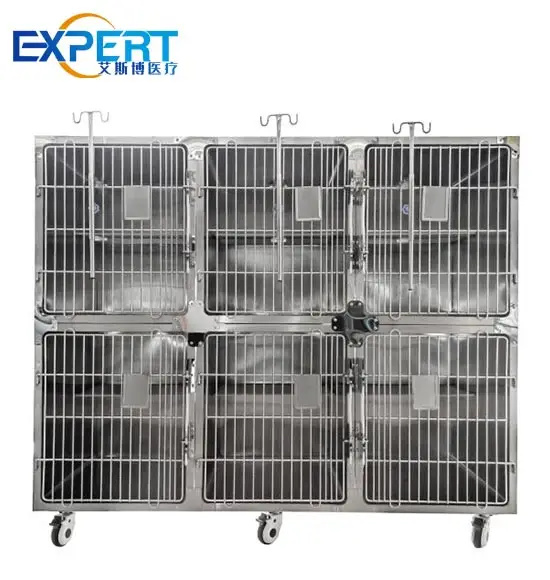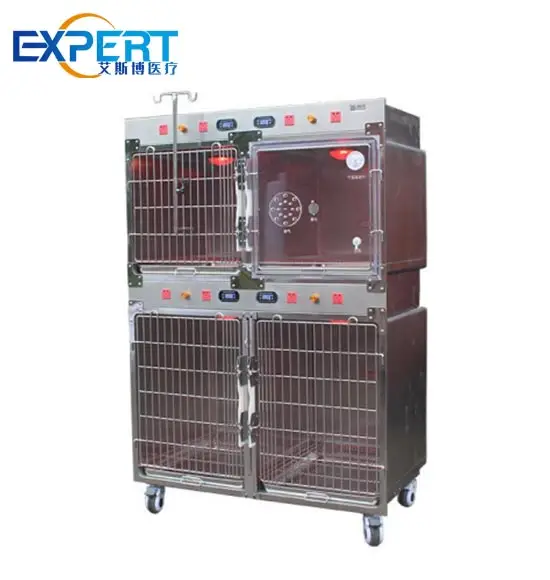Die Anschrift
304 Nordkardinal St.
Dorchester Center, MA 02124
Arbeitsstunden
Montag bis Freitag: 7:00 - 19:00
Wochenende: 10:00 - 17:00
Die Anschrift
304 Nordkardinal St.
Dorchester Center, MA 02124
Arbeitsstunden
Montag bis Freitag: 7:00 - 19:00
Wochenende: 10:00 - 17:00

Veterinary clinic cages are an essential part of any veterinary practice, providing a safe and comfortable environment for animals during their stay. Choosing the right cages is crucial to ensure the well-being of the animals and the efficiency of the clinic. This comprehensive guide will help you understand the key factors to consider when selecting veterinary clinic cages, ensuring you make an informed decision that benefits both your practice and your patients.

Veterinary clinic cages are specialized enclosures designed to house animals temporarily during their treatment or recovery. These cages are built to provide a safe, clean, and comfortable environment, allowing veterinarians to monitor and care for their patients effectively.
The material of the cages is a crucial factor in ensuring longevity and ease of maintenance. Common materials include stainless steel, aluminum, and high-quality plastics. Stainless steel cages are popular due to their durability, corrosion resistance, and ease of cleaning.
Benefits of Stainless Steel Cages:
Veterinary clinic cages come in various sizes to accommodate different animals, from small pets like cats and rabbits to larger dogs. It’s essential to choose cages that provide enough space for the animals to move comfortably. Additionally, configurable cages offer flexibility, allowing you to adjust the size and arrangement based on the clinic’s needs.
Considerations for Size and Configurability:
Proper ventilation is crucial for maintaining a healthy environment within the cages. Adequate airflow helps control temperature, reduce odors, and prevent the buildup of harmful bacteria and viruses. Look for cages with well-designed ventilation systems that ensure a steady flow of fresh air.
Importance of Ventilation:
Safety is paramount when selecting veterinary clinic cages. The cages should have secure latches to prevent animals from escaping and smooth, rounded edges to avoid injuries. Additionally, the materials used should be non-toxic and safe for animals.
Safety Features to Look For:
Maintaining a clean and hygienic environment is essential in a veterinary clinic. Choose cages with smooth surfaces and minimal crevices, making them easy to clean and disinfect. Removable trays and panels can also facilitate thorough cleaning.
Cleaning Considerations:
| Material | Haltbarkeit | Ease of Cleaning | Korrosionsbeständigkeit | Kosten |
|---|---|---|---|---|
| Stainless Steel | Hoch | Easy | Hoch | Hoch |
| Aluminum | Mäßig | Mäßig | Mäßig | Mäßig |
| High-Quality Plastic | Mäßig | Easy | Hoch | Niedrig |

Setting up and maintaining veterinary clinic cages correctly is essential for ensuring the health and safety of the animals. Follow these best practices for optimal cage use:
Ensure that all staff members are adequately trained in handling and caring for animals in the cages. Proper training helps prevent accidents and ensures the well-being of the animals.
Choosing the best veterinary clinic cages involves considering various factors, including material, size, ventilation, safety, and ease of cleaning. By selecting high-quality, durable cages, you can ensure a safe and comfortable environment for the animals in your care. Proper setup, maintenance, and staff training further contribute to the effectiveness of the cages in providing optimal animal care. By following this comprehensive guide, you can make informed decisions and enhance the overall functionality and efficiency of your veterinary clinic.
Stainless steel is a popular choice due to its durability, ease of cleaning, and corrosion resistance. Aluminum and high-quality plastics are also used, each offering different benefits.
Choose cages with secure latches, smooth edges, and non-toxic materials. Regularly inspect the cages for damage and ensure proper setup and maintenance.
Proper ventilation helps control temperature, reduce odors, and prevent the buildup of harmful bacteria and viruses, ensuring a healthy environment for the animals.
Cages should be cleaned and disinfected after each use to maintain hygiene and prevent the spread of infections. Regular inspections and maintenance are also necessary.
The size of the cages should provide enough space for the animals to move comfortably. Consider the type and size of the animals and choose cages that accommodate their needs while fitting within the clinic’s layout.